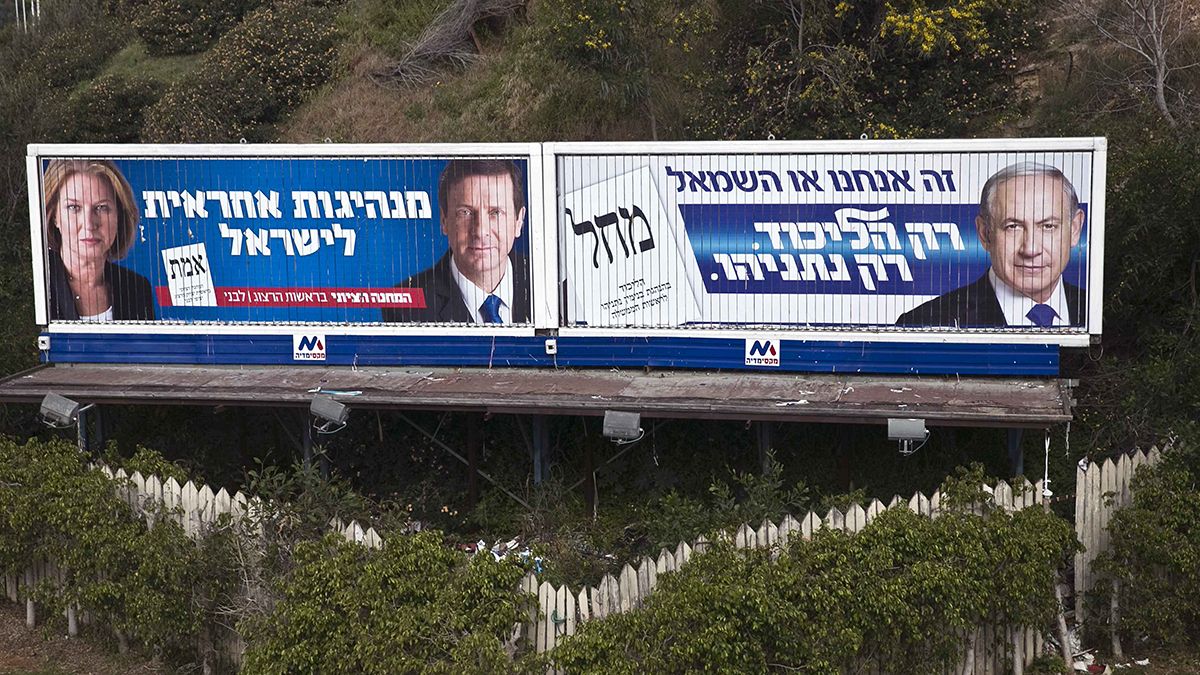International observers are keen to know what the election will mean for peace talks with the Palestinians.
Two years after the country’s last general election, Israeli politicians have been in campaign mode once again.
Voters will cast their ballots on Tuesday in an election called after the collapse of Prime Minister Benjamin Netanyahu’s coalition government in December.
Netanyahu fired Finance Minister Yair Lapid and Justice Minister Tzipi Livni over their outspoken criticism of a bill that would have enshrined in law Israel’s status as a Jewish State.
Opponents said it would alienate the country’s Arab minority, who make up 20 percent of its population.
Now, polls show support slipping for Netanyahu’s centre-right Likud party. His stiffest challenge comes from the centre-left Zionist Bloc, which is led by Labour Party chief Isaac Herzog and Livni.
Both have attacked Netanyahu for failing to tackle key economic and social issues, especially the cost of living.
The incumbent has responded to those attacks by trying to paint Herzog and Livni as soft on foreign policy and security issues.
Both want to restart Middle East peace talks with the Palestinians, but the 65-year-old centre-right premier used a Jerusalem Post interview on Thursday to warn they would be willing to divide Jerusalem.
Three-time prime minister Netanyahu has loomed large on the Israeli political scene for nearly three decades.
In a bid to bolster his security credentials with voters, he warned the US Congress on the dangers of a nuclear deal with Iran.
The 65-year-old accepted the invitation from leading Republicans without the blessing of US president Barack Obama.
The move caused a rift between the two allies. Senior Democratic Congresswoman Nancy Pelosi branded the speech as “an insult to the intelligence of the United States.”
But does the prospect of a nuclear Iran really worry Israelis as much as it does their prime minister?
Euronews correspondent James Franey asked Tal Schneider, one of the country’s top political journalists, which issues mattered most to voters ahead of this election.
euronews: It’s just more than two years since the Israeli public last went to the polls. How do they feel about being asked to vote again?
Tal Schneider, Israeli journalist and blogger: We in Israel are used to having elections not on schedule. It is nothing new. But surely 24 months is nothing. Governments should be more stable and the Israeli public are upset that the governments here are not stable and we have to go to polls again in such a short time.
euronews: So a sense of frustration with the Israeli political class, but what’s the biggest issue that voters are talking about?
Tal Schneider: We felt and we experienced a rise in the price of housing and goods in the last five, six years and that is all people talk about. They don’t talk about terror; they don’t talk about Iran – in a weird way. Specifically they do talk about terror a bit. Obviously we are eight months after a devastating war so they do talk about security issues, but they hardly talk about the Iranian issue. That was a thing put on the agenda by the Prime Minister but it was not really dealing with what people had on their minds.
euronews: So do these economic issues explain Benjamin Netanyahu’s slide in popularity?
Tal Schneider: Netanyahu has projected in the last couple of years a sort of ‘distant-from-the-public’. A sort of “I’m not interested in economic issues, I’m just interested in Iran,” which is a big threat obviously but it is not a threat to daily life. So he found himself at the end of the campaign really detached from the issues that are on the table of the Israelis. Food, education, health…like any other normal Western country.
euronews: What can you tell us about Mr. Netanyahu’s main challengers, Isaac Hertzog and Tzipi Livni, the leaders of the (centre-left) Zionist Bloc? Have they given any indications that they would approach negotiations with the Palestinians differently?
Tal Schneider: Netanyahu is just finishing six years in which he has not taken any initiatives. Even after the war in Gaza, which according to all experts there was an opportunity there to build some sort of regional arrangement, he has done nothing about it. On the other hand, Herzog, specifically Herzog. He has no experience at (war) cabinet ministers’ level. He was serving only as a social affairs minister. He didn’t do top security jobs. And we know for a fact that in the last couple of years he met with Abu Mazen (Mahmoud Abbas) and he went to Ramallah several times. His entire party is keeping in touch with the Palestinian (group) Fatah and keeping in touch and making economic plans. But obviously that is on the top of their agenda. It’s on the top of the agenda for their voters. One of the things that Herzog will have to fix immediately will be the Israeli relationship with the White House. This is definitely going to be maybe the first call of next Tuesday or Wednesday is picking up the phone to White House and just fixing whatever has been done here in the last couple of months, which was very devastating to watch from the side.
